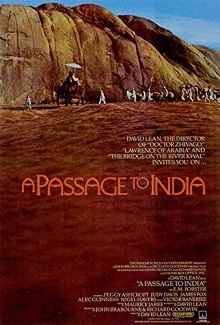A Passage to India (film)
| A Passage to India | |
|---|---|

Original theatrical poster
|
|
| Directed by | David Lean |
| Produced by |
John Brabourne Richard B. Goodwin |
| Screenplay by | David Lean |
| Based on |
A Passage to India by Santha Rama Rau |
| Starring | |
| Music by | Maurice Jarre |
| Cinematography | Ernest Day |
| Edited by | David Lean |
|
Production
company |
|
| Distributed by |
Thorn EMI Screen Entertainment (UK) Columbia Pictures (US) |
|
Release date
|
|
|
Running time
|
163 minutes |
| Country | United Kingdom |
| Language | English |
| Budget | £17 million |
| Box office | $27.2 million (US) |
A Passage to India is a 1984 British epic period drama film written and directed by David Lean. The screenplay is based on the play of the same name by Santha Rama Rau, which was based on the novel of the same name by E.M. Forster.
This was the final film of Lean's career, and the first feature-film he had directed in fourteen years, since Ryan's Daughter in 1970. Receiving universal critical acclaim upon its release with many praising it as Lean's finest since Lawrence of Arabia, A Passage to India received eleven nominations at the Academy Awards, including Best Picture, Best Director for Lean, and Best Actress for Judy Davis for her portrayal as Adela Quested. Peggy Ashcroft won the Academy Award for Best Supporting Actress for her portrayal as Mrs Moore, making her, at 77, the oldest actress to win the award, and Maurice Jarre won his third Academy Award for Best Original Score.
The film is set in the 1920s during the period of growing influence of the Indian independence movement in the British Raj. Adela Quested (Judy Davis) and Mrs Moore (Peggy Ashcroft) sail from England to India, where Ronny Heaslop (Nigel Havers), Mrs Moore's son and Adela's suitor, is a magistrate in the provincial town of Chandrapore. Adela is considering marriage to Ronny, but is visiting India accompanied by his mother to see if she can adapt to living in such a foreign place.
...
Wikipedia
